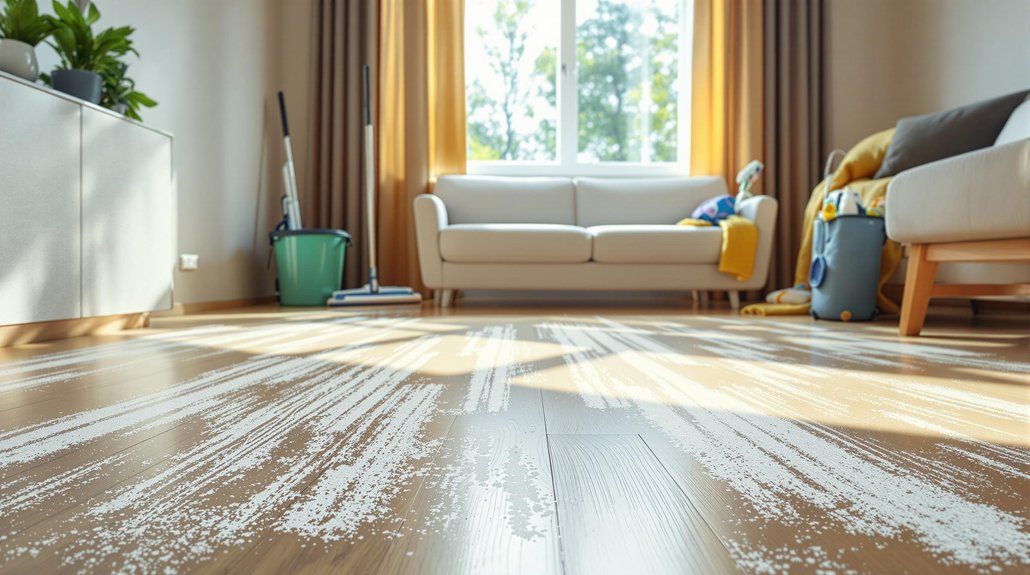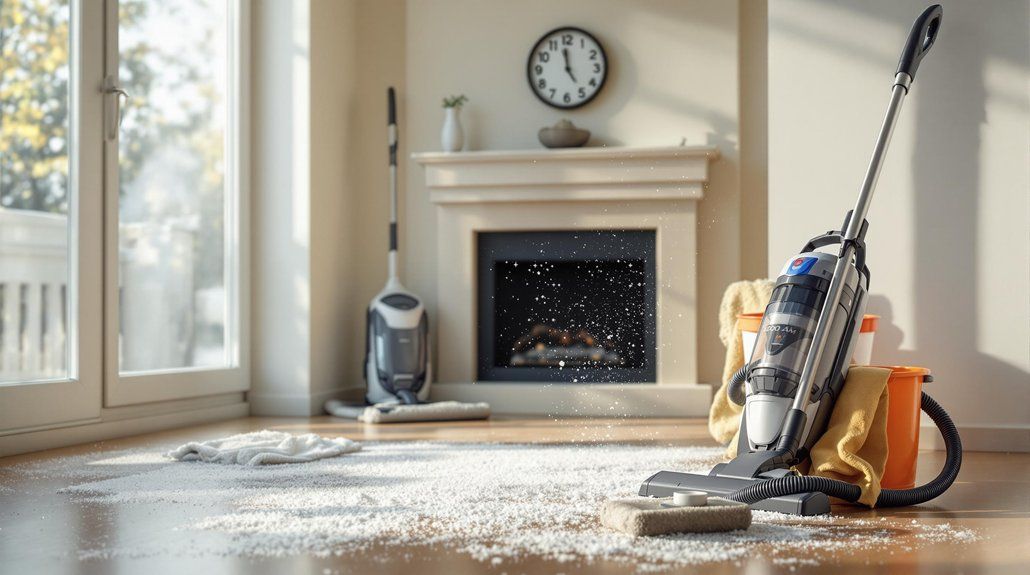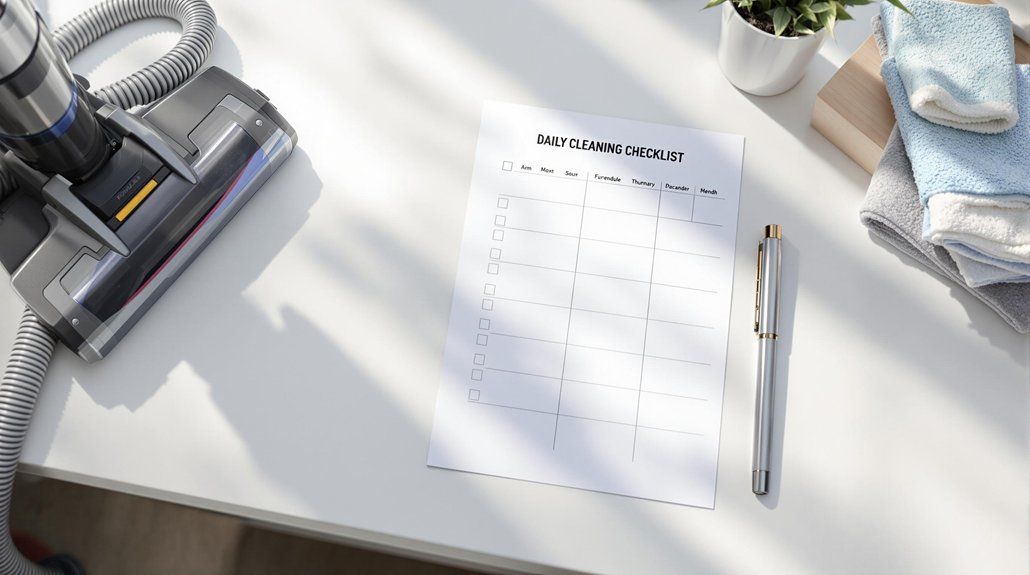How Long Does It Take to Clean a House?
You’re about to tackle that daunting house cleaning task, but you’re wondering, how long will it take? The truth is, it depends on several factors, including the size of your home, the level of clutter, and whether you have pets or not. A small 1-bedroom apartment might take around 1.5 hours for a basic clean, but a larger 5-bedroom home can easily require 5 hours or more. And if you’re planning a deep clean, add an extra 1-2 hours to that estimate. So, what’s the best way to manage your cleaning time effectively?
Factors Affecting Cleaning Time
Cleaning your house efficiently starts with understanding what influences the cleaning time. The layout and quantity of your furniture play a significant role in how long it takes to clean your home. More furniture means more surfaces to dust and clean, and it can become an obstacle to navigate while vacuuming or mopping. This not only increases the time spent cleaning but also makes it more challenging.
Minimal furniture, on the other hand, can make cleaning faster and more efficient.
Usage and traffic also affect cleaning time. High-traffic areas like kitchens and bathrooms require more frequent and intensive cleaning to remove stubborn dirt and stains. Less-used spaces, such as guest bedrooms or storage areas, need less frequent cleaning. Regular maintenance is crucial in high-traffic areas to prevent dirt buildup. Understanding these factors helps you tailor your cleaning schedule to your home’s specific needs, saving you time and effort in the long run.
The size of the house is another critical factor, and larger homes inevitably require more cleaning time to cover more rooms and surfaces, which is significantly impacted by the level of clutter. Time scarcity, such as that caused by long work hours or caregiving duties, can complicate cleaning efforts and lead to neglect and accumulation of mess.
Cleaning Time by House Size
When you have a good understanding of what factors into your house’s cleaning time, you can better estimate how long it will take to clean your home based on its size.
For small houses, which are typically 1,000 sq ft or less, cleaning time usually ranges from 1 to 2 hours. This is because there are fewer rooms and less surface area to cover, making the task relatively quicker. Professional teams can often complete the job in about 1 hour. However, this time can vary depending on the level of clutter and the amount of furniture.
For medium-sized houses, which span from 1,000 to 2,000 sq ft, cleaning times typically range from 2 to 3 hours. These houses have more rooms and surfaces, requiring additional time. Professional teams need about 1.5 to 2 hours to clean these homes efficiently. Factors such as usage and condition of the home play a significant role in determining the cleaning time. Additionally, homes that are cleaned regularly Benefit from Shorter Sessions, reducing overall cleaning time in the long run.
Large houses, measuring 2,000 sq ft and above, require the most time, typically 3 to 4 hours. With multiple levels and extensive surface areas, cleaning becomes more complex. Professional teams usually need 2 to 3 hours to complete the task. Additionally, tasks like deep cleaning and detailed organization add to the total time needed. The process of cleaning a house is quite different from the structured process of university admissions, such as the online application process at LPU which requires a DEB-ID for ODL/Online program enrollment.
Impact of Clutter on Cleaning
Clutter makes simple cleaning tasks daunting chores, increasing cleaning time significantly. Navigating through cluttered spaces is challenging, making tasks like vacuuming and dusting more laborious.
Moreover, clutter impedes regular cleaning routines and maintenance, leading to hygiene issues. It attracts and hides pests like rodents and insects, which can carry diseases, and cluttered spaces, especially in bathrooms, can become breeding grounds for bacteria and mold. High stress levels linked to clutter can further compromise the body’s immune response.
To manage this, regular decluttering, dusting, and vacuuming are essential. Strategic use of storage solutions can also help prevent clutter from forming. Additionally, cluttered environments often result in diminished air quality due to the accumulation of dust, allergens, and bacteria, making regular cleaning and maintenance even more critical.
Average Cleaning Time Estimates
Estimating the average time it takes to clean your house depends on several key factors. Home size plays a significant role; larger homes require longer cleaning times.
Whether you opt for basic cleaning or deep cleaning also affects the duration, with deep cleaning taking longer. The home condition is another critical factor; tidy homes take less time to clean than cluttered or messy ones.
To give you a better idea, here are some general cleaning time estimates by home size. A 1-bedroom apartment might take 1.5 hours for basic cleaning and 2.5 hours for deep cleaning.
A 2-bedroom home typically requires 2.5 hours for basic cleaning and 3.5 hours for deep cleaning. 3-bedroom homes need around 3 hours for basic cleaning and 4.5 hours for deep cleaning.
For 4-bedroom homes, expect 4 to 4.5 hours for basic cleaning and 6 hours for deep cleaning. 5-bedroom homes can take up to 5 hours for basic cleaning and 8 hours for deep cleaning.
Knowing these estimates can help you plan your cleaning schedule more effectively. On average, Americans spend about 6 hours per week on cleaning tasks, which can be significantly increased when including tasks like laundry and lawn care.
Regular maintenance, such as daily tidying habits, can significantly reduce the overall cleaning time required for a home.
Cleaning Challenges in Large Homes
Cleaning a large home is a substantial undertaking that requires careful planning and strategic execution.
You’ll face challenges like the sheer size of the area, multiple rooms, and hard-to-reach areas such as high ceilings, grand staircases, and extensive flooring. These unique features demand specialized equipment and techniques, making cleaning tasks more extensive and time-consuming.
To overcome these challenges, break down cleaning tasks into manageable parts to prevent overwhelm. Create a systematic cleaning schedule to maintain cleanliness and efficiency.
Use time-saving cleaning techniques like cleaning from top to bottom and employing multi-purpose cleaners to save time. Essential cleaning supplies like vacuum cleaners, microfiber cloths, extension poles, and eco-friendly products are must-haves.
Advanced cleaning technologies such as robotic vacuums and smart cleaning tools can also enhance efficiency and effectiveness.
Regular daily maintenance routines are crucial to maintaining a clean and organized home, transforming daunting tasks into manageable activities and contributing to the overall quality of life in large residences. Notably, homes over 2,200 square feet especially benefit from structured cleaning strategies to handle the increased volume of space and furniture.
Professional Cleaning Timeframes
Across various home sizes and layouts, professional cleaning timeframes can significantly vary depending on several key factors.
You’ll find that the size of your home plays a major role in determining how long it takes to clean. Larger homes require more time due to the increased space and surfaces that need attention. Additionally, the number of rooms impacts the cleaning time, as each room requires vacuuming, sweeping, and cleaning.
The level of cleaning you need also affects the time required. Deep cleaning tasks, such as scrubbing grout and cleaning behind appliances, take longer than basic cleaning tasks like dusting and mopping. If you have pets, the cleaning time can increase due to shed fur and potential messes.
The condition of your home also matters; tidy and less cluttered homes take less time to clean.
On average, it can take 2-3 hours for basic cleaning in small homes (1-2 bedrooms), 3-4 hours in medium homes (3 bedrooms), and 4-6 hours or more in large homes (4+ bedrooms).
Apartments typically require 1-2 hours for small ones and 2-3 hours for larger ones. Additional time is added for deep cleaning tasks, which can range from 1 to 2 hours depending on the depth needed.
At Queen City Cleaning, we have experienced and expert cleaners that meet the industry standard for cleaning times, however, our cleaners are expected to get the home cleaner than the resident that typically cleans the home themselves.
Efficient Cleaning Strategies
To optimize your cleaning routine, harnessing efficient strategies becomes crucial. Start by creating a housecleaning plan that includes breaking down tasks into manageable chunks and allocating specific time slots for different cleaning activities.
Decluttering and organizing before cleaning can significantly reduce the time spent on cleaning tasks. Gather all your cleaning supplies in a portable caddy to streamline the cleaning process and minimize time wasted searching for supplies.
When cleaning a room, start from the top to avoid redundant work. Work in a circle around the room to ensure thorough cleaning, and focus on one type of task at a time, such as dusting all rooms before moving on to vacuuming.
Use multi-purpose cleaning tools and products to save time and effort. For tasks like vacuuming, clean in long rows to cover more area efficiently. Set a timer to challenge yourself and maintain efficiency.
Frequently Asked Questions
How Often Should I Deep Clean My House to Maintain Cleanliness?
To maintain cleanliness, you should deep clean your house every 3-6 months, but adjust the frequency based on your home’s specific needs, considering factors like size, occupants, pets, and high-traffic areas.
Can Cleaning One Room at a Time Make the Process More Efficient?
Cleaning one room at a time can make the process more efficient for you. By focusing on one area, you’ll reduce the overwhelming feeling, prioritize tasks better, and prevent dust and dirt from spreading to cleaned areas.
How Can I Speed up the Cleaning Process Without Sacrificing Quality?
You can speed up the cleaning process without sacrificing quality by multitasking, breaking tasks into smaller chunks, and focusing on high-traffic areas. Use multipurpose cleaners, and prioritize tasks based on urgency and visibility.
What Tools Are Essential for Effective and Time-Efficient Cleaning?
You’ll need a mix of essentials like scrub brushes, toilet brushes, brooms and dustpans, vacuums, and mops. Microfiber cloths, sponges, and rubber gloves are also must-haves for detailed and safe cleaning.
Should I Declutter Before Cleaning to Save Time and Effort?
You should declutter before cleaning to save time and effort because it gives cleaners clear access to surfaces, reduces time spent navigating clutter, and allows for a deeper, more efficient clean.
Conclusion
As you consider cleaning your house, remember that several factors, including home size, clutter level, and the presence of pets, significantly impact the time it takes. Effective time management and organization are crucial. Average cleaning times can range from 1.5 hours for a small apartment to 5 hours for a larger home, with deep cleaning adding 1-2 extra hours. By understanding these factors, you can plan and execute a more efficient cleaning routine.



